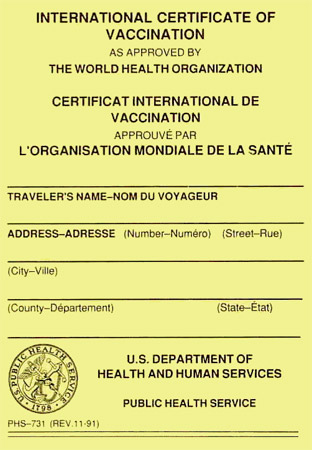Health and Medical: Immunizations
From the US Centers for Disease Control
Latest advice:
| Vaccines for disease | Recommendations | Clinical Guidance for Healthcare providers |
|---|---|---|
| Routine vaccines |
Make sure you are up-to-date on all routine vaccines before every trip. Some of these vaccines include
|
Immunization schedules |
| COVID-19 | All eligible travelers should be up to date with their COVID-19 vaccines. Please see Your COVID-19 Vaccination for more information. |
COVID-19 vaccine |
| Hepatitis A | Consider hepatitis A vaccination for most travelers. It is recommended for travelers who will be doing higher risk activities, such as visiting smaller cities, villages, or rural areas where a traveler might get infected through food or water. It is recommended for travelers who plan on eating street food. |
Hepatitis A - CDC Yellow Book Dosing info - Hep A |
| Hepatitis B | Recommended for unvaccinated travelers younger than 60 years old traveling to the United Kingdom. Unvaccinated travelers 60 years and older may get vaccinated before traveling to the United Kingdom. |
Hepatitis B - CDC Yellow Book Dosing info - Hep B |
| Measles | Cases of measles are on the rise worldwide. Travelers are at risk of measles if they have not been fully vaccinated at least two weeks prior to departure, or have not had measles in the past, and travel internationally to areas where measles is spreading. All international travelers should be fully vaccinated against measles with the measles-mumps-rubella (MMR) vaccine, including an early dose for infants 6–11 months, according to CDC’s measles vaccination recommendations for international travel. |
Measles (Rubeola) - CDC Yellow Book |
| Rabies | Dogs infected with rabies are not commonly found in the United Kingdom. If rabies exposures occur while in the United Kingdom, rabies vaccines are typically available throughout most of the country. Rabies pre-exposure vaccination considerations include whether travelers 1) will be performing occupational or recreational activities that increase risk for exposure to potentially rabid animals and 2) might have difficulty getting prompt access to safe post-exposure prophylaxis. Please consult with a healthcare provider to determine whether you should receive pre-exposure vaccination before travel. For more information, see country rabies status assessments. |
Rabies - CDC Yellow Book |
| Tick-borne Encephalitis | Avoid bug bites Learn more about tick-borne encephalitis at your destination. |
Tick-borne Encephalitis - CDC Yellow Book |
The above information has been excerpted from the US "Centers for Disease Control and Prevention" website and was last updated by World Trade Press on Sunday, 1st December, 2024. Addtional information is available at https://cdc.gov
Copyright © 1993—2024 World Trade Press. All rights reserved.

 United Kingdom
United Kingdom 
